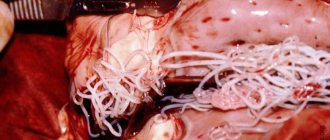Before vaccination, the dog must be given anthelmintics. This is very important because the body, weakened by parasites, may not cope well with vaccination and give a negative reaction in the form of fever, diarrhea, vomiting or even seizures. In addition to an adverse reaction, the body may simply not develop immunity to the vaccine. Any pet can be affected by worms, and it doesn’t matter whether he walks outside or sits at home.
Anthelmintic for dogs before vaccination
Giving antihelminthic drugs before vaccination is a standard mandatory veterinary procedure aimed at destroying internal parasites. Without deworming and if the dog has worms, unforeseen complications may arise, because... helminthiasis is actually a disease and weakens the pet's immune system. Only completely healthy animals can be vaccinated!
Is it necessary to remove worms before vaccination?
Deworming is a set of procedures aimed at preventing infection with worms (helminths, nematodes) or removing them from the body.
An animal can be treated for worms at a veterinary clinic. But usually it is done independently at home.
To understand whether it is necessary to worm a dog, you need to understand the principle of vaccination. Vaccinations protect the body from deadly infectious diseases: rabies, canine distemper, parainfluenza, adenovirus, etc.
The protection mechanism is achieved by developing one’s own immunity. To do this, dead or weakened virus strains are introduced into the body. It is as if the body “gets acquainted” with them and produces antibodies, which, upon re-infection, immediately eliminate the enemy agents.
But while immunity is being developed, the dog’s body weakens. Therefore, before vaccination, she must be completely healthy and treated for parasites.
If you vaccinate a pet infected with helminths, the following consequences are possible.
- Allergic reactions.
They are caused by parasites; normally the symptoms are mild, but with the introduction of serum they intensify significantly.- The immunity will develop weakly or not at all
- nematodes disrupt the formation of specific defense mechanisms, so vaccinating dogs affected by worms is useless.- Infection.
Since the animal’s body is already weakened by helminths and the toxins that they secrete during life, the body may not suppress the introduced virus and the opposite situation will arise: the vaccination will not develop immunity, but, on the contrary, will lead to the development of dangerous infectious diseases.
Some owners believe that there is no need to worm their dog - they are sure that their pet is not infected with worms. But this is a disastrous position: nematodes are not always detected even when examining stool; eggs or larvae can easily be missed. And discovering them on your own is completely unrealistic.
Therefore, it is better not to risk it and deworm the animal. After all, how much a couple of deworming tablets will cost cannot be compared with the likely long-term treatment or death of the dog.
Why vaccinate your dog?
Vaccination is the administration of drugs that create a pet’s immune defense against viral or bacterial diseases. The main (a.v.) substance (weakened, dead pathogens, antibodies) initiates the work of protective forces in the body, forming immunity to a certain type of disease. Subsequently, if the dog comes into contact with the carrier, the risk of illness or death from infection is minimized.
Vaccination provides protection against the following (major, severe) diseases:
- Rabies.
- Parainfluenza.
- Hepatitis.
- Plague of carnivores.
- Parvovirus enteritis.
- Leptospirosis.
The mortality rate from these pathologies, especially in puppies, in some cases reaches 50-100%.
Preparing for puppy vaccination and possible complications
The vaccination preparation plan should look like this:
- Carry out deworming
- It is not recommended to give food in the morning before vaccination, but you can drink unlimited amounts of water.
- In cases where the vaccination is given after lunch, you need to give the puppy light food 3-4 hours before vaccination, this will prevent possible weakness and apathy.
In some breeds, in a small percentage of cases, changes occur in the body, such as swelling or the appearance of a lump at the injection site; it is treated only if it becomes further enlarged and painful. Mostly resolves on its own within 1-3 weeks. To observe the possible appearance of symptoms, it is enough to observe your pet for a day; in cases where the symptoms continue for more than 24 hours, you should consult a doctor.
In the following days:
- Increased body temperature
- Loss of appetite
- Occasional vomiting or diarrhea
- General lethargy
When to seek professional help:
- Diarrhea doesn't stop
- Gagging reflexes continue
- State of shock
- Lack of appetite and refusal to eat for more than 24 hours
- Discharge of all kinds of fluids from the mouth, eyes, nose
After a couple of days, a general examination by a veterinarian is recommended to identify pathologies that are not visually visible.
Our Ya-Vet center provides a wide range of services for identifying and preventing diseases of any complexity. We also have a service to call a doctor at home, this opportunity will save your time. Our veterinarians will not only provide the correct vaccination to your puppy, they will also tell you about further care for the animal, and also advise you on any issue that arises.
When is vaccination not recommended?
Vaccination is postponed in the following cases:
- Body temperature is above 39.2 C.
- Acute course of the disease or exacerbation of chronic pathology.
- Injuries, surgical procedures, treatment and recovery period.
- Exhaustion, lack of weight.
- Estrus, mating, change of teeth, pregnancy and feeding puppies.
- The puppy is up to 8 weeks old.
- Vaccine intolerance, individual sensitivity to components.
- Helminth infestation.
It is mandatory to give tablets (suspension) to the dog before vaccination. Appointments are made by a veterinarian after examining the pet.
Answers to frequently asked questions
Hosts often ask similar questions. The most common of them concern contraindications.
Is it possible to deworm in such situations?
This type of question can be roughly combined with the following phrase: “What if my dog has...” And then there is a specific situation.
During heat
No, it's not worth it. It is better to do this 2 weeks before the heat.
During pregnancy or nursing
No. Possible embryotoxic effects and disruption of the normal development of the offspring.
Before sterilization
Yes, as described above, this is even mandatory and is done in about 10 days.
How many days before vaccination should a dog be wormed?
This procedure is planned in advance, especially during the puppy’s primary vaccination. If, based on tests (symptoms), helminth infection is definitely established, then deworming will need to be carried out twice.
Important! How many days before vaccination should a dog be dewormed? The optimal time is 10-14 days, subject to a single treatment; in case of repeated administration of the drug, another 14-21 days are added.
Conditions for worming dogs before vaccination:
- Treatment is carried out in the morning, on an empty stomach or 3 hours after feeding.
- The dose is calculated strictly individually.
- The age, weight and concomitant diseases of the dog are taken into account.
- Be sure to control the act of defecation in your pet. When certain anthelmintics are given, paralyzed worms can be passed in the feces. Often, with extensive infestations, the pet vomits worms.
Modern anthelmintic drugs do not require the administration of laxatives, but it is necessary to study the instructions for the drug or follow the prescriptions of the veterinarian.
It is possible to defeat parasites!
Antiparasitic Complex® - Reliable and safe removal of parasites in 21 days!
- The composition includes only natural ingredients;
- Does not cause side effects;
- Absolutely safe;
- Protects the liver, heart, lungs, stomach, skin from parasites;
- Removes waste products of parasites from the body.
- Effectively destroys most types of helminths in 21 days.
There is now a preferential program for free packaging. Read expert opinion.
Read further:
Pyrantel: dosage for dogs in the form of a suspension or tablets, how to use
Anthelmintic herbs for people: a list of the best anthelmintic herbs and their uses
Which is better: Piperazine or Pyrantel - compare two anthelmintics
Pyrantel during pregnancy at various stages, use and reviews
Are vaccinations against toxoplasmosis given to humans, cats and dogs?
Pyrantel for worms (suspension and tablets): instructions for use for children and adults
Approximate schedule of deworming before vaccination
How soon to vaccinate a dog after deworming is decided on an individual basis, but there is a general plan that should be followed.
The pet is dewormed once 10-14 days before the vaccine is administered. If necessary, this period is reduced to 5-7 days, because The period of removal of anthelmintic components from the body is on average 2-4 days. If infection is suspected, treatment is carried out twice with an interval of 1.5-2 weeks.
Approximate schedule for planned deworming of dogs up to a year before vaccination (may shift by 1-2 weeks depending on the situation):
| Age\week\month | Note |
| 4-5 | First administration of the drug |
| 6-7 | Repeated as necessary (nematodoses) |
| 8 | First vaccination |
| 12 | Revaccination |
| 5-6 months | Giving antihelminthics to a teenager after changing teeth |
| 11-12 months | Double scheduled deworming |
| 12-13 months | Routine annual vaccination for adult dogs |
Further, according to the plan, deworming takes place once every quarter (3-4 months). If skin parasites (fleas) are found in a dog, external treatment is first carried out. After 2-4 days, anthelmintic agents are given twice, with an interval of 14-21 days, in order to destroy not only the adults, but also the hatched larvae.
How to clean a dog of worms: review of drugs + prices
Pharmacological veterinary companies produce many anti-worm products. They differ in composition, action, price and safety. Below are the best drugs with minimal side effects.
List of effective remedies
Animals from two months and older can use any anthelmintic: this is the age at which most drugs are suitable. The main thing is to follow the dosage by weight.
The best way to worm an adult dog at home (prices are approximate):
- Drontal Plus.
Tablets with meat flavor. Available in 2 dosages - 10 kg (300 rubles) and 35 kg (600 rubles). Helps against round and tape worms, lamblia. Rarely cause negative reactions. - Milbemax.
Delicious chewable capsules with chicken flavor. The main advantage is the abundance of dosages for puppies and dogs of different weights. The medicine contains milbemycin, therefore it is prohibited for collies and related breeds. Price – 650-1,000 rubles depending on the form of release. - Alben S.
One of the best and inexpensive drugs - a package of 6 tablets costs about 150 rubles. But giving the medicine is inconvenient: each capsule is designed for 5 kg, so you have to combine several tablets for dogs with larger weights. - Pratel.
A cheap and popular remedy - it is sold for 50-60 rubles per tablet. However, it only works on roundworms and tapeworms and does not help against flat nematodes. Puppies under 1.5 months are prohibited. - Advocate.
Drops on the withers with complex action. They help not only against helminths, but also against ectoparasites. However, they only lead to the death of round nematodes. The product is produced in dosages by weight: up to 4 kg, 4-10 kg, 10-25 kg and 25-40 kg. Cost – 350-650 rubles per pipette, depending on the form of release. - Inspector Total S.
Another drops on the withers of complex action. Available in the same dosages as Advocate. The effect of the two drugs is similar, but the Inspector additionally kills ixodid ticks. They sell for 350-700 rubles. - Polyverkan.
Good medicine in the form of sugar cubes. Animals eat them with pleasure, and if not, the briquettes can be easily dissolved in water and poured into the mouth from a syringe. They sell individually for 70-80 rubles.
Anthelmintics for puppies up to 1-2 months
Choosing what to worm a puppy at 1 month or earlier is not easy. There are few products produced, and those that exist do not always work, as they contain minimal dosages of active substances.
The following drugs get rid of helminths and do not cause side effects in kittens:
- Drontal Junior.
Sweet syrup is suitable for puppies from 2 weeks. It kills worms in a couple of days without causing negative reactions. Give a solution at the rate of 1 ml per 1 kg of weight. Costs on average 650 rubles per 50 ml bottle. - Prazicide solution.
A universal product that is suitable for puppies from 3 weeks. There are 2 forms: for pets of medium and large breeds (they give 1 ml per 3 kg), and also for small ones (1 ml per 1 kg). Price – 150 rubles. - Dehinel Plus.
A good medicine for large breed puppies - the minimum dosage is calculated for 10 kg of weight. Non-toxic, adverse reactions occur only in animals hypersensitive to febantel, praziquantel or pyrantel. Can be used from 3 weeks. Sells from 180 rubles. - Procox.
A good drug in the form of a suspension, it helps against round nematodes and coccidia. Used for puppies from 2 weeks at the rate of 1 ml per 2 kg. The minimum cost is 500 rubles.
Breeds for which not all medications are suitable
Some breeds do not tolerate ivermectin and emodepside, toxins that have nematocidal effects. These drugs lead to allergies, tremors, paresis and even death.
Special breeds include:
- collie;
- Sheltie;
- Australian Shepherd;
- bobtail;
- whippet;
- silky windhound.
Therefore, if your pet is a breed from the list, before purchasing an anthelmintic, make sure that it does not contain these substances.










